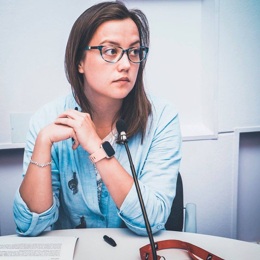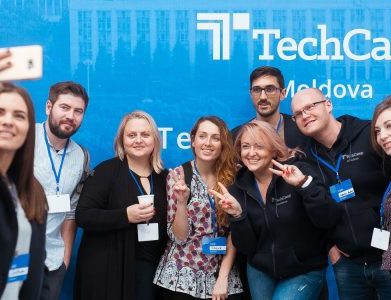TechCamps bring together expert trainers from around the world to mentor participants and encourage them to turn their ideas into initiatives that make a real impact. TechCamp trainers are leaders in their field and often apply for grants to develop their own projects after being inspired by their time at TechCamp.
Christiana Varda is one of the outstanding expert trainers who co-led TechCamp Cyprus in December 2018 and received a follow-up grant to develop her media literacy project. TechCamp Cyprus brought together over 50 participants from Cyprus, Greece, Estonia, Turkey, Latvia, Serbia, Georgia, and Moldova to collaborate and exchange ideas on how to combat disinformation in the digital age. We caught up with Varda to talk to her about the importance of digital citizenship and how her experience at TechCamp inspired her to launch an accessible media literacy curriculum for teachers.
Answers have been edited for brevity and clarity.
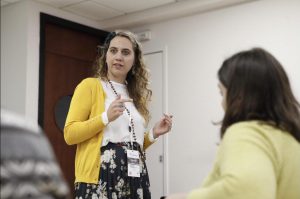
Why are media literacy and digital citizenship important to you personally?
Media literacy has been at the core of my whole professional life. Just as I was entering the workforce upon graduating from university, we were witnessing a radical change to the way we conceptualized media, users, and online communities. This shift in how we perceive media was facilitated by the emergence of social networks and the rise of affordable handheld technology, which provided ordinary users with the tools to create their own media productions and voice their opinions to audiences anywhere in the world. The digital developments of the last 15 years have made understanding how to navigate a world that is saturated in media messages – like social media news feeds, advertisements, and online news and films – of utmost importance today.
We have become increasingly reliant on the very technologies that empower us, but also shape and limit our own personal worldview. Therefore, digital citizenship shouldn’t be seen as separate to media literacy, but rather as an extension to it. All efforts to enhance media literacy skills should emphasize that beyond learning how to read and critically deconstruct media, we must also consider how this critical stance towards media and information can be translated into actions that have an impact within the civic sphere. This is the challenge for anyone working in media literacy education today, especially within the context of online misinformation: How can we shift from being “monitorial” citizens to active citizens whose actions are informed and purposeful?
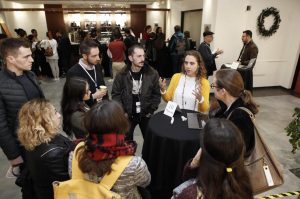
Could you tell us a little about your background and how you became interested in media literacy?
I have versatile experience in education, media and digital technologies. I co-organised the first nationwide Technological Camp for students ages 7-18 in 2008, with courses in video editing, robotics, game and web design. In 2009 I joined a private secondary school and introduced and taught the Media Studies A-level until 2018. In 2018, I decided I wanted to apply my knowledge and experience as a media educator to develop community actions and to work more closely with youth, teachers, and other key stakeholders. This led me to founding Media What in 2019, a non-profit organization that is committed to promoting media literacy through participatory media production activities that empower community voices and enhance critical thinking.
I am currently also an Associate Researcher and PhD student at the Media, Cognition, and Learning Research Group at Cyprus University of Technology, where I focus on media literacy, misinformation, and social media. I work on the Co-Inform project, a European-funded research project which aims to create tools that will increase society’s resilience to online misinformation and generate more informed behaviors and policies. I graduated as a Schreyer Honors Scholar from the Pennsylvania State University, where I studied on a full CASP/Fulbright scholarship.
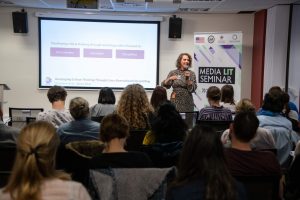
During the Tech Camp I got the chance to talk with a lot of participants from many different fields. I used to work in secondary education as a Media Studies teacher and it was interesting to see other teachers from different subject areas who were equally curious and excited to integrate media literacy in their classes. One of the challenges of media literacy is that it refers to a set of skills that encompasses a broad spectrum of media issues. Teachers involved in curriculum development who might want to integrate media literacy need to have media-related knowledge and expertise, which may not always be feasible. This realization was the spark that set the idea into motion. Using my experience in curriculum development and my expertise as a media educator, I decided to frame the lesson plans within three broader pillars (Memory, Identity, and Citizenship) that are more likely to fit within broader curriculum aims across different school contexts.
What phase is Media Learn at now? What is your long-term goal for the project?
Media Learn is an ongoing project and will continue to grow in terms of its contents. Media What, our media literacy lab, is involved in a series of different actions throughout the year and all educational workshops and material will always be translated into digestible lesson plans, including slides and any additional material. One of Media What’s key objectives is to develop education activities and initiatives that can be integrated in the classroom. Media Learn will serve as our open access platform by which educators, in Cyprus and abroad, can access our material.
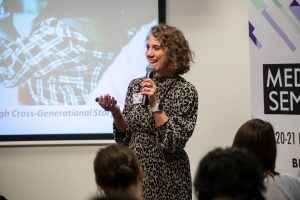
What has the response been to Media Learn so far? We know you presented at the Media Lit Seminar in Brussels, could you tell us more about that?
The response so far has been very positive from educators and peer researchers. As regards the Media Lit Seminar in Brussels, the session focused on a set of lessons we had developed for a project that were available on Media Learn. By the end of the session, a number of teachers expressed their gratitude and surprise that all modelled activities that we had included in the workshop were available on the platform for free. I have asked teachers who mentioned that they would integrate the lessons in their own courses to keep me updated.
Additionally, since filing the most recent update for Media Learn to TechCamp, I have connected with an assistant professor at the Department of Education at the University of Cyprus, one of the three public universities in Cyprus, and I will give a guest lecture to a class of undergraduate juniors studying education on how we developed and designed the lessons currently uploaded on the platform. Unfortunately, this lecture will now take place in a virtual setting, so we’re missing out on that physical connection, but this also proves how important it is to have access to these resources online, especially in this surreal context we are experiencing right now.
Did you make any lasting connections at TechCamp Cyprus? If so, with whom?
Yes, I’ve formally collaborated with two of the trainers for a TechCamp follow-up grant (Disinformation Battles), and this collaboration has led to discussions of creating a memorandum of understanding among our different organizations in order to continue our collaboration in addressing misinformation challenges within Cyprus. We are in the process of formalizing this collaboration. Additionally, I have submitted a project proposal with one of the Tech Camp trainers for a separate funding call. I have also stayed in touch through social media with many of the participants that attended my session. It’s been a very rewarding experience to stay connected even a year after the TechCamp took place.
